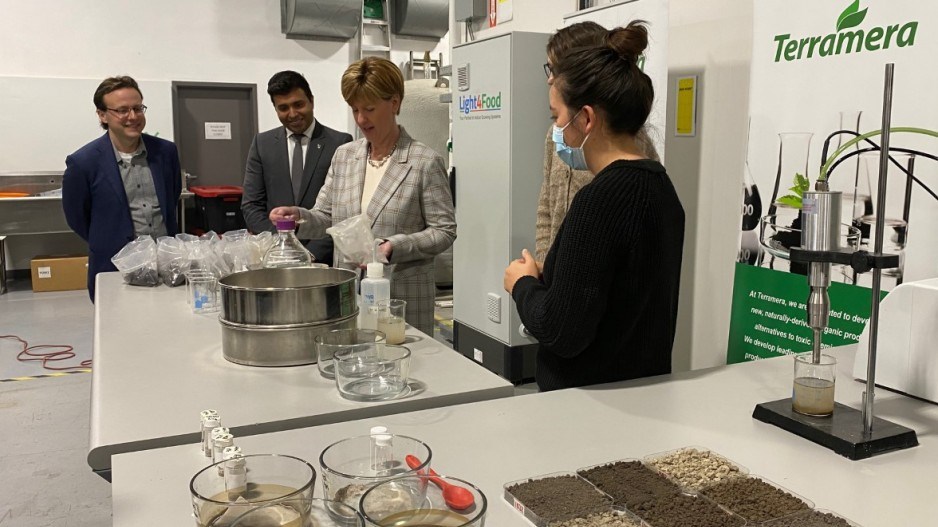A new soil sampling approach being developed by Vancouver agri-tech company Terramera is one of 47 projects receiving $15 million in federal funding for agricultural science.
Federal Minister of Agriculture and Agri-Food Marie-Claude Bibeau and Liberal MP Taleeb Farouk Noormohamed (Vancouver-Granville) were at Terramera’s headquarters in Vancouver Tuesday for the funding announcement.
The latest $15 million tranche in funding comes from the $165.7 million Agricultural Clean Technology Program. Terramera will receive up to $2 million under the funding program for a soil sampling technology it is developing that would give farmers a new “precision agriculture” tool.
“Farmers are investing in new practices and technologies to keep their land healthy, productive and resilient,” Bibeau said. “But adopting a new practice or technology is not always easy. It takes time, it takes resources, it takes technical support.”
Terramera has commercialized a product called RANGO – a natural, plant-based alternative to synthetic pesticides – and is now developing a novel soil sampling approach that will provide “a molecular fingerprint of the soil at much higher resolution than anything available right now,” said Terramera CTO Travis Good.
The “novel sensor” Terramera is developing would give farmers more precise measurements of things like nitrogen-phosphorus-potasium (NPK) levels, as well as carbon content.
Getting more accurate and frequent readings of soil health would aid farmers in using fertilizers more precisely.
“Fertilizer is one of those things, if you are over-prescribing it, you’re losing a lot of money,” Good said. “And if you under-prescribe, you lose yield. So you want to be able to dial that in really well. So that’s what we’re helping to do.”
There are serious concerns right now over the cost and availability of nitrogen fertilizer due to the war between Ukraine and Russia, which are major producers of two key constituents of nitrogen fertilizers – potash and natural gas. The sampling approach Terramera is developing might allow farmers to reduce their use of fertilizer without sacrificing crop yield.
“Farmers can make better decisions about how and when to apply inputs,” Good said. “Using methods like variable rate fertilizer application can save costs.
“Right now, soil sampling is usually done every three years, and it’s pretty sparse,” Good said. “Unlike traditional soil testing, we will be able to provide and use our novel sensor to give this measurement in real time and in field without costing farmers more than they pay now.”
Getting better, more precise and more frequent readings of soil chemistry might help farmers improve agricultural productivity and do so more sustainably. It would also give them a better understanding of the soil’s carbon content.
At some point, farmers might qualify for carbon credits of some sort if they can demonstrate that their farming practices are providing a net carbon sink on their land.




